Alcohol and kidney stones is something many people ask about. Is alcohol safe for people with kidney stones? Can alcohol cause kidney stones? Is it okay for me to have a beer?
Most of us know that drinking a lot of fluid is good for kidney stones, so how does alcohol play into this? Keep reading to learn more!
Table of Contents
The Skinny: Can Alcohol Cause Kidney Stones?
In short: no. Alcohol does not cause kidney stones. In fact, some studies have shown that drinking alcohol is protective against kidney stones.
One study followed 45,000 men for 6 years. They found that people who drank 8oz of wine had a 39% reduced risk of developing kidney stones. Beer was also associated with a 21% reduced risk. The correlation between hard liquor and kidney stones was not as strong. (1)
A similar study followed over 81,000 women for 8 years. This study also found that people who drank wine had a 59% reduced risk of kidney stones. No significant effect was seen with beer or liquor. (2)
Does this mean we should all start drinking alcohol to reduce kidney stones!? Of course not. Alcohol is not a healthy choice for everyone and there are important factors to consider when deciding to consume alcohol.
Risks of Alcohol
No conversation about alcohol would be complete without mentioning that alcohol is a drug and is not benign. Excess alcohol increases the risk of many medical conditions (3):
- High blood pressure and heart disease
- Cancer of the breast, mouth, throat, esophagus, liver and colon
- Weakened immune system
- Dementia and cognitive decline
- Social problems such as lost productivity and unemployment
It is important to weigh these risks when deciding to drink alcohol. If you are at increased risk of any of these conditions, alcohol may not be the right choice for you.
If you cannot control how much you drink, are pregnant or under 21 years of age, you should not drink alcohol.
It is also important to make sure alcohol does not interact with any medications you are taking. Ask your doctor or pharmacist if alcohol is okay to have with your medications.
How Does Alcohol Prevent Kidney Stones?
Diuresis
Alcohol makes you pee. Many of us intuitively know this from multiple trips to the restroom when we have drinks!
This phenomenon is called “diuresis”, which may be part of the reason why alcohol can help prevent kidney stones. Urinating more makes you urine volume go up. A higher urine volume reduces saturation of troublesome solids such as calcium or oxalate. This reduces the risk of stones.
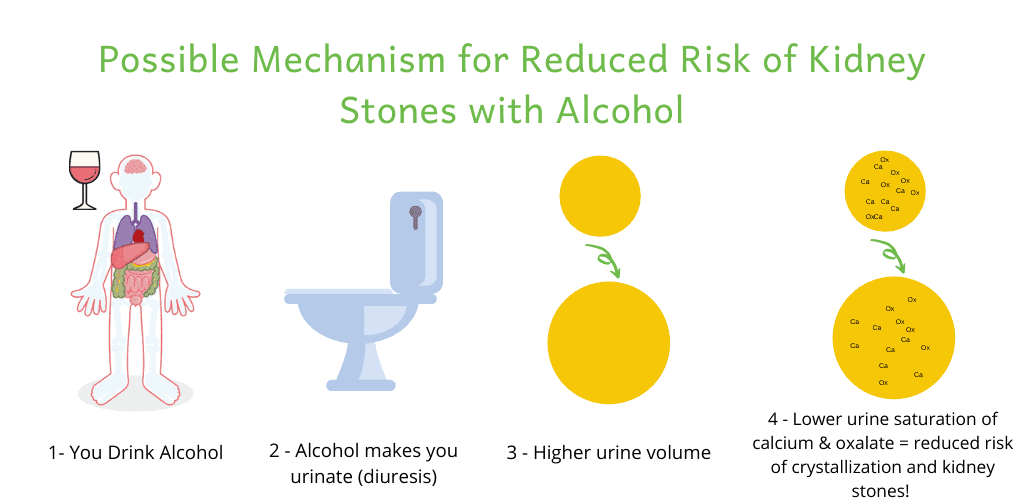
However, when you do not replace water lost during diuresis, we can get into trouble. Dehydration and reduced urine volume will cause a sharp rise in kidney stone risk. If you do choose to drink alcohol, make sure to drink extra water to prevent dehydration. A good rule of thumb is to drink at least 1 glass of water for every alcoholic drink you have.
More Fluid!
Another possible reason alcohol can prevent kidney stones is simply that alcohol adds more fluid! Drinking plenty of fluid is kidney stone prevention 101.
The American Urological Association recommends drinking enough fluid to make 2 1/2 liters of urine each day. (4) For most of us, this means a daily fluid goal of about 3 liters, or 100 fluid ounces.
What Alcohol is Best for Kidney Stones?
Can Wine Cause Kidney Stones?
Wine has been shown to reduce the risk of kidney stones more than other alcoholic drinks. (1,2)
If you choose to drink alcohol for kidney stones, I would recommend wine over other alcohol for kidney stones. Red wine has the heart health benefits too! (5)
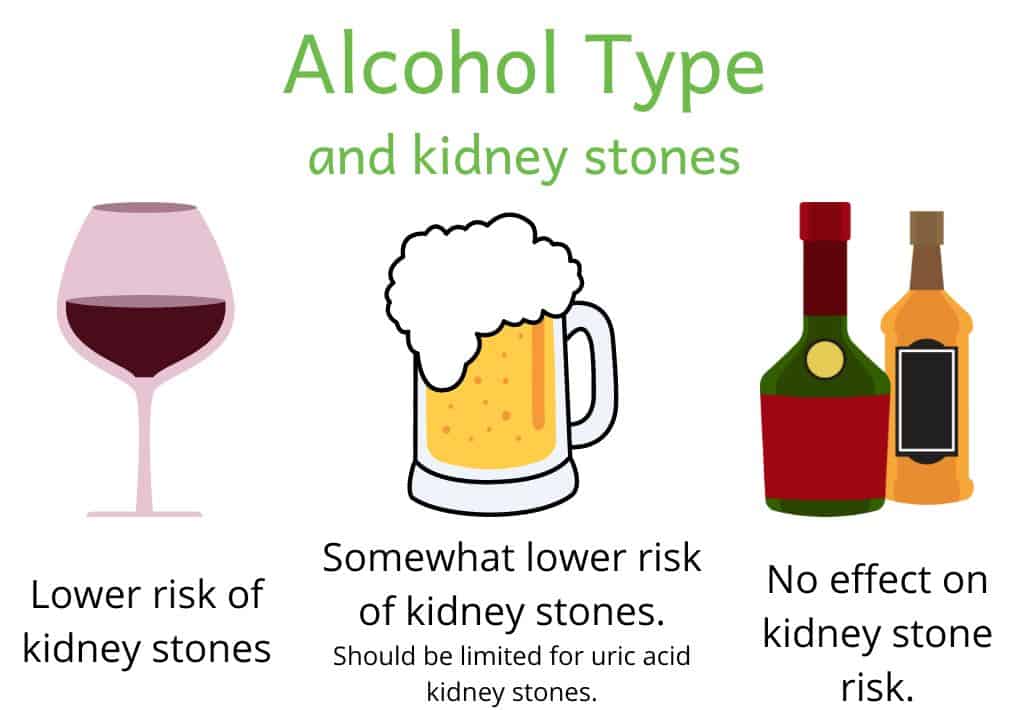
Can Beer Cause Kidney Stones?
In men, beer did reduce the risk of kidney stones, however this benefit was not found in women. (1,2)
If you have uric acid kidney stones, beer isn’t ideal. Beer has a lot of purine, which break down to uric acid. High amounts of uric acid can increase risk of both calcium and uric acid kidney stones. If you form uric acid kidney stones, I strongly caution against drinking a lot of beer.
People with gout should limit high purine foods as well, including beer.
Overall, beer is not the best alcohol for people with kidney stones.
Is Beer High in Oxalate?
A conversation about kidney stones is never complete without mentioning oxalate. Most (about 80%) kidney stones are calcium oxalate.
Beer is not high in oxalate. Amounts differ by type of beer. But, even at the high end, 12 fluid ounce of beer has about 6mg of oxalate. (5) This is not a significant amount. If you are consuming enough beer to provide appreciable amounts of oxalate, I’d have MUCH bigger concerns than that oxalate!
Can Liquor Cause Kidney Stones?
Research has not shown a benefit of liquor for kidney stones.
Be Mindful of Sugar in Alcohol for Kidney Stones
Too much excess sugar can cause kidney stones. Eating too much sugar, especially in the form of sugar sweetened drinks like soda or energy drinks can cause more calcium in urine, which increases the risk of kidney stones (6,7).
If your alcohol comes with a lot of sugar, it could cause kidney stones.
Here is the sugar content in common alcoholic drink mixers (8):
- Regular Cola (12 fl oz) = 35 grams
- Ginger Ale (12 fl oz) = 38 grams
- Regular Lemon Lime Soda (12 fl oz) = 33 grams
- Diet Soda (12 fl oz) = 0 grams
- Orange Juice (8 fl oz) = 24 grams
- Cranberry Juice Cocktail (8 fl oz) = 31 grams
- 100% Cranberry Juice (8 fl oz) = 7 grams
- Pineapple Juice (8 fl oz) = 29 grams
- Tonic water (8 fl oz) = 21 grams
- Simple syrup (1 fl oz) = 14 grams
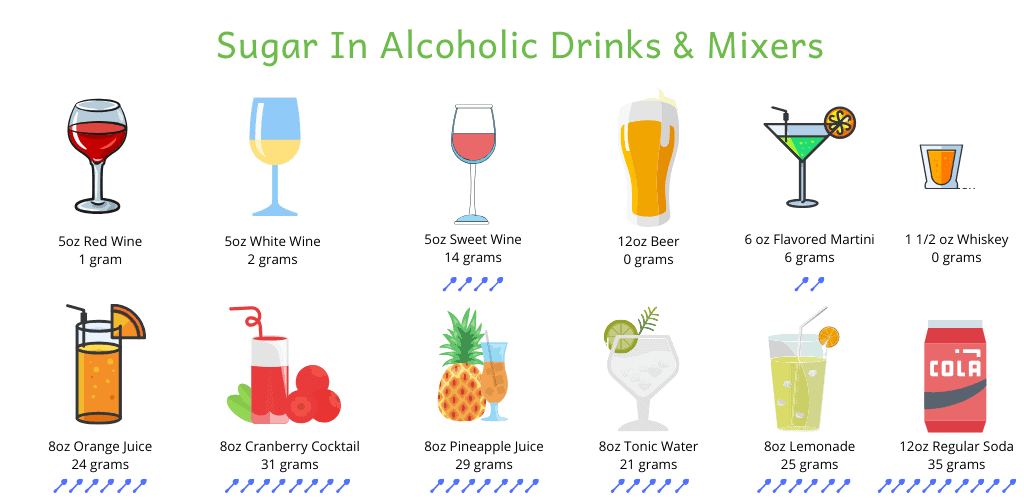
Portion is Key
As with many things in nutrition, more of a good thing does not make it better. Excess alcohol is not a healthy choice for anyone. If you do choose to drink, it is best to keep your portions to the recommended serving sizes (3):
- 12 fl oz beer (5% alcohol, includes most domestic or “light” beers)
- 8 fl oz malt liquor (7% alcohol, includes most “craft” or dark beers)
- 5 fl oz wine (12 % alcohol)
- 1 ½ fl oz hard liquor (80 proof, or 40% alcohol, includes liquor such as gin, rum, vodka, tequila or whiskey)
Of course, moderate alcohol consumption is more than just keeping each drink to the appropriate portion size. It is also how many drinks you have at one time.
If you do choose to drink alcohol, the Centers for Disease Control (CDC) recommends no more than 1 drink for women and 2 drinks for men in one sitting (9).
Other Benefits of Alcohol
Alcohol does have benefits other than a reduced risk of kidney stones. Moderate consumption of red wine has been associated with reduced risk of heart disease. (5) Red wine has a large amount of antioxidants and other bioactive components such as resveratrol and quercetin. These antioxidants stop harmful free radicals from harming our bodies and causing damage to our heart and vasculature. Antioxidants can also help reduce cancer risk.
It is important to note that excessive alcohol use is associated with an increased risk of heart disease and many cancers.
Moderate alcohol consumption has also been shown to strengthen social bonds and even trigger release of endorphins. (10) It would be silly to ignore the social benefits of alcohol and the culture around drinking at sporting events, taking a trip to a beautiful vineyard or grabbing a drink with co-workers during happy hour.
The Verdict: Can Alcohol Cause Kidney Stones?
In short, alcohol, especially wine, is associated with a reduced risk of kidney stones. However, this does not mean everyone should start drinking alcohol to reduce kidney stone risk.
There are many other, more impactful, changes you can make to prevent kidney stones based on your 24-hour urine test results. (11)
Excess alcohol comes with serious risks, which must be taken into account when making the decision to drink. If you do decide alcohol is right for you, pay close attention to portion size and how many drinks you have at one time. If you do this, alcohol can be part of a healthy diet for kidney stones!
Cheers & Happy Eating!
Melanie

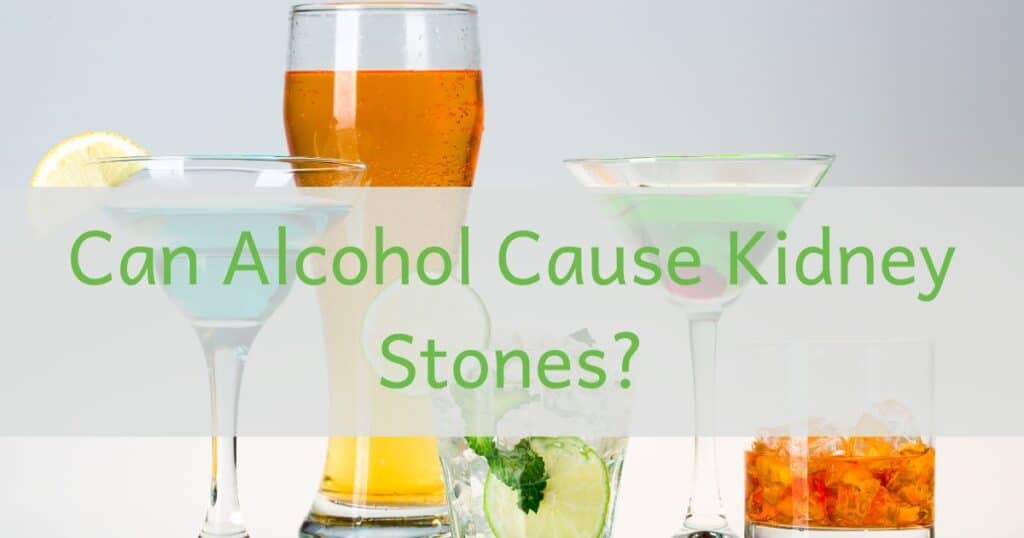
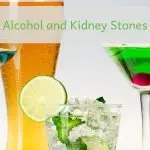
Beer might be low in sugar content, but it rapidly raises blood sugar. My belief is that it contains a lot of starchy carbohydrates that quickly break down into sugar after consumption. Beer is effectively a high-carb, high-calorie beverage. A very few brands make fairly low-carb beers, but they tend to be low in flavor and body.
conversations on alcohol are incomplete without mentioning one more effect it can possibly have on kidney stones. Alcohol loosens our inhibitions. thus we are more likely to ignore our diets when drinking, thus consuming more of our limited sugars, sodium, animal protein, etc. Since alcohol if typically consumed in settings where these items are abundant, we might tend to go overboard, especially on sodium. As you’ve frequsaid, one meal doesn’t make a stone. But a pattern of do so, might.
(Taken from my Weight Watchers leader’s annual lecture every holiday.)
Hello, very informative article. It was my understanding that grapes contain calcium oxalate. Shouldn’t you avoid eating grapes along with any food or beverages (wine) that contains grapes? Or is one glass of wine daily acceptable?
Also, does tequila (agave) contain calcium oxalate that causes kidney stones ?
Thank you.
Hi Marie! I’m glad you enjoyed the article. The goal of nutrition for calcium oxalate stone prevention is not to necessarily avoid foods that contain calcium or oxalate. It is much more nuanced than that. This article should help!
Can you discuss Staghorns? Is it necessary to have it removed? My urlogist says it is in an area that won’t, or should not, be a problem. What can you tell us about them?
Hi Barry! That is definitely more of a question for a urologist. I specialize in how nutrition can prevent stones, and am not a doctor. So, just like doctors shouldn’t give nutrition advice (*wink*), I won’t give doctor advice. I do know that the best plan of action for removal depends on SO many things, including stone type, size and location. Your doctor will be able to answer this much better than me!
Quality posts is the key to invite the visitors to go to see the web site, that’s what
this site is providing.